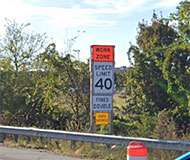12/16/2020
Federal Judge Declines To Intervene In DC Speed Camera LawsuitFederal judge sends class action suit against photo radar speed trap back to a DC court.

A federal court on Tuesday dismissed a lawsuit filed against a sneaky speed trap set up in Washington, DC. US District Judge Dabney L. Friedrich found that the case would be better heard in a courtroom under city, not federal, jurisdiction. The class action suit filed in March argued that photo radar devices were deliberately set up on a stretch of Interstate 295 where the speed limit plunged from 50 MPH to 40 MPH with only a single, easy-to-miss sign on the side of the highway noting the change -- even though the city ordinance requires more notice.
City officials lowered the speed limit to 40 MPH in that location and doubled the fine to $200 during a construction project that began in May 2019. Though the "construction zone" ordinance was used to justify the fine, there was no construction going on. Motorists Teresa and Reginald Matthews sued Mayor Muriel Bowser in a DC court, but the mayor moved the case to the federal court hoping the judge would throw out the suit in its entirety.
Instead, the judge decided to toss just the claim that DC's speed trap violated the US Constitution. The court acknowledged that this was a "wrongfully designated construction zone" but found the motorists lacked standing to contest the District's conduct in a federal forum.
"Although the plaintiffs allege that Reginald Matthews and Teresa Matthews drive on I-295 every day, they do not allege that any one of them will drive past the single remaining camera in the future," Judge Friedrich wrote. "And the court cannot assume, for the purposes of assessing standing, that a plaintiff who has violated the law in the past will violate the law again."
The court then rejected the argument that a $200 ticket for driving in a wrongfully designated construction zone violated due process rights and the constitutional protection against excessive fines.
"As an initial matter, this is not a typical excessive fines claim, as the plaintiffs do not simply argue that the amount of the fine was excessive," Judge Friedrich explained. "Rather, they argue there was no justification for the District to impose any fine at all... In the end, a $200 fine for speeding is not so 'grossly disproportionate,' as to be unconstitutionally excessive."
The judge ruled against Mayor Bowser by deciding to send the remaining claims back to the DC Superior Court.
"Whether or not an allegedly wrongful traffic fine could fit within the claim of unjust enrichment or money had and received appears to be matters of first impression in DC law," Judge Friedrich concluded. "Given the early posture of this case, and out of deference to the development of state law, the court will decline to exercise supplemental jurisdiction over these claims."
A copy of the ruling is available in a 300k PDF file at the source link below.


